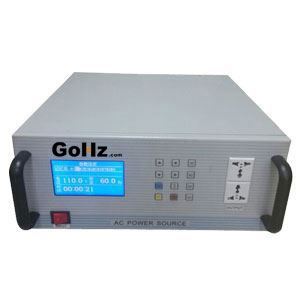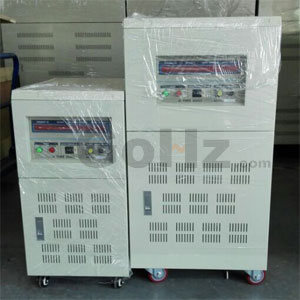Can I operate 50Hz appliances at 60Hz power supply?
There are some frequency converters that can convert 60Hz to 50Hz, or vice, but it's too costy to be used for home appliances, it would be better if there is an economic way to run 50Hz electrical appliances on 60Hz system.

When I say the world is moving to DC is because we see more and more the use of power electronics everywhere. Home electronics, LED lighting, Electric vehicles, Trains, Subways, even several motor application needs power electronics in order to operate at variable speed. So, we could take advantages of the generation of electricity that already uses power electronics like wind generators and solar panels to install these devices near the consumers and store them and use the DC directly to the appliances. We could have, for instance, DC 6 to 12 V outlet in houses instead of AC 110V 60Hz or 220V 50Hz. These applications would reduce largely the dependency over large AC power generation plants and large transmission lines. Just an idea to change the world and reduce costs in the future.
That is an unsafe act in whatever way it is being tried and it is very un-engineering (i.e. plugging 110V/220V 60Hz/50Hz appliance to a socket outlet of 220V/110V 50Hz/60Hz). Therefore, it is the engineer's/technician's duty to know the required voltage intake of the appliance in question, which can easily be ascertained from the appliance's specification. These three electrical power formulas (P=VI, P=V^2/R, P=I^2*R) are the employable mathematical references.
You'll blow up the adapter. If you do the opposite your Xbox will flash. Or unless you are absolutely sure it on take it. It's better to never plug an 110v 60Hz appliance in a 220v 50Hz socket and vice versa. And it requires a dedicated 110v GFCI outlet. Since I plugging an 110v 60Hz appliance into a 220v 50Hz receptacle will cause...but I can't think of any reason you would need to do so. You never want to plug 110v 60Hz into 220v 50Hz or vice versa.
Well for one thing, the 110v 60Hz electrical appliance will blow the fuse and also the power supply. 220v 50Hz appliance might start up, and burn the PC board as supply voltage is too low for that appliance. It depends upon the nature of the appliance but generally speaking if the voltage is too high it draws too much current and burns out, if the voltage is too low it draws too little current and/or does not perform to its rating. The mathematical reference is Ohm's Law and the Power Triangle.

When I say the world is moving to DC is because we see more and more the use of power electronics everywhere. Home electronics, LED lighting, Electric vehicles, Trains, Subways, even several motor application needs power electronics in order to operate at variable speed. So, we could take advantages of the generation of electricity that already uses power electronics like wind generators and solar panels to install these devices near the consumers and store them and use the DC directly to the appliances. We could have, for instance, DC 6 to 12 V outlet in houses instead of AC 110V 60Hz or 220V 50Hz. These applications would reduce largely the dependency over large AC power generation plants and large transmission lines. Just an idea to change the world and reduce costs in the future.
That is an unsafe act in whatever way it is being tried and it is very un-engineering (i.e. plugging 110V/220V 60Hz/50Hz appliance to a socket outlet of 220V/110V 50Hz/60Hz). Therefore, it is the engineer's/technician's duty to know the required voltage intake of the appliance in question, which can easily be ascertained from the appliance's specification. These three electrical power formulas (P=VI, P=V^2/R, P=I^2*R) are the employable mathematical references.
You'll blow up the adapter. If you do the opposite your Xbox will flash. Or unless you are absolutely sure it on take it. It's better to never plug an 110v 60Hz appliance in a 220v 50Hz socket and vice versa. And it requires a dedicated 110v GFCI outlet. Since I plugging an 110v 60Hz appliance into a 220v 50Hz receptacle will cause...but I can't think of any reason you would need to do so. You never want to plug 110v 60Hz into 220v 50Hz or vice versa.
Well for one thing, the 110v 60Hz electrical appliance will blow the fuse and also the power supply. 220v 50Hz appliance might start up, and burn the PC board as supply voltage is too low for that appliance. It depends upon the nature of the appliance but generally speaking if the voltage is too high it draws too much current and burns out, if the voltage is too low it draws too little current and/or does not perform to its rating. The mathematical reference is Ohm's Law and the Power Triangle.
I have AC cooler which is name plate data is 230v, frequency of 50hz, single phase but what will happen? if the supply line single phase 220v, frequency of 60hz. automatically the speed of the AC cooler will increase but my question is is there any heating effect to the cooler?
I have a number of appliances name plate is 230V or 240V 50Hz
I have now had two of them, either burn out or some internal device trip or burn, because I ran them for long periods of time on 240V 60Hz
I think they were running faster, from the sound, and they were certainly running Hotter. . . . I suspect it was the internal heat that caused them to burn out or internally trip.
I would not advise running an AC Cooler like that, as that would certainly be running for long periods of time.
My two devices were Vacuum Cleaner and a Pressure Washer. . . Both overheated after about an hours continuous use.
I have now had two of them, either burn out or some internal device trip or burn, because I ran them for long periods of time on 240V 60Hz
I think they were running faster, from the sound, and they were certainly running Hotter. . . . I suspect it was the internal heat that caused them to burn out or internally trip.
I would not advise running an AC Cooler like that, as that would certainly be running for long periods of time.
My two devices were Vacuum Cleaner and a Pressure Washer. . . Both overheated after about an hours continuous use.
Will a 220v 50hz Minc foil applicator still operate at its optimum if I plug it to a 220v 60hz power outlet? Will it not be damaged? Thank you.
I have a 3 Phase, 380 Volts, 60 Hz. refrigerant compressor and the power supply source is 3 Phase, 380 Volts, 50 Hz. After running for sometime, I observed that the power cable is abnormally overheating. Kindly advise what is the solution to this problem.
Hello
I want some fans that are manufactured in the UK but I live in the US. The fans come in both 110v and 240v versions but since they are made in the UK both versions are 50hz. Would the 110v 50hz work in the USA? I REALLY WANT THESE FANS I WILL DO WHATEVER TO MAKE THEM WORK.
I want some fans that are manufactured in the UK but I live in the US. The fans come in both 110v and 240v versions but since they are made in the UK both versions are 50hz. Would the 110v 50hz work in the USA? I REALLY WANT THESE FANS I WILL DO WHATEVER TO MAKE THEM WORK.
What a ridiculous answer to a simple question, which asked nothing about 6 volt DC or running 110 volts on 220 power! From other sources, it is my understanding that 220v 50 hz will generally run on 240v 60 hz, but not necessarily the other way around. How simple was that? Jeez!
Post a Comment:
You may also like:
50Hz 60Hz Frequency Converter Setting
Using GoHz frequency converter to
Or customize your own converters.
- Convert 220v 50Hz to 110v 60Hz,
- Convert 120v 60Hz to 230v 50Hz,
- Convert 110v 60Hz to 240v 50Hz,
- Convert 480v 60Hz to 380v 50Hz,
- Convert 400v 50Hz to 460v 60Hz,
- Convert 240v 60Hz to 380v 50Hz,
Or customize your own converters.
Featured Articles
460v 60Hz motor on 400v 50Hz power ...
 Often the European motors at 1hp size are universal for 50Hz or 60Hz power supply, as long as you have 400V x 50Hz and 460V x ...
Often the European motors at 1hp size are universal for 50Hz or 60Hz power supply, as long as you have 400V x 50Hz and 460V x ...
 Often the European motors at 1hp size are universal for 50Hz or 60Hz power supply, as long as you have 400V x 50Hz and 460V x ...
Often the European motors at 1hp size are universal for 50Hz or 60Hz power supply, as long as you have 400V x 50Hz and 460V x ...Convert 220v, 230v, 240v 50Hz to 110v, ...
 When you buy an 110v (120v) 60Hz appliance from USA, and run it on 220v (230v, 240v) 50Hz country (i.e. UK, Australia, ...
When you buy an 110v (120v) 60Hz appliance from USA, and run it on 220v (230v, 240v) 50Hz country (i.e. UK, Australia, ...
 When you buy an 110v (120v) 60Hz appliance from USA, and run it on 220v (230v, 240v) 50Hz country (i.e. UK, Australia, ...
When you buy an 110v (120v) 60Hz appliance from USA, and run it on 220v (230v, 240v) 50Hz country (i.e. UK, Australia, ...60Hz motor running on 50Hz power ...
 Electric motors, both single and three phase, are designed for running on a specified power frequency. But sometimes we may use a ...
Electric motors, both single and three phase, are designed for running on a specified power frequency. But sometimes we may use a ...
 Electric motors, both single and three phase, are designed for running on a specified power frequency. But sometimes we may use a ...
Electric motors, both single and three phase, are designed for running on a specified power frequency. But sometimes we may use a ...